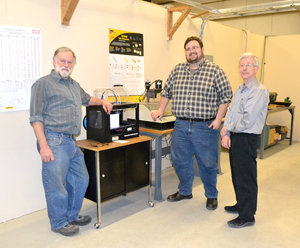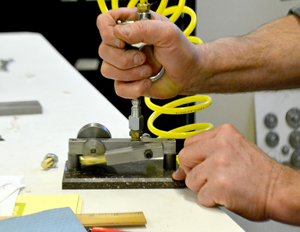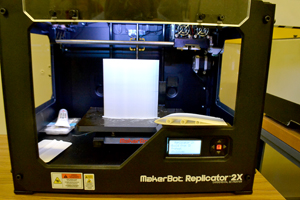

copyright the Chronicle April 2, 2014
by Bethany M. Dunbar
LYNDONVILLE — The Northeast Kingdom might soon have an incubator space for entrepreneurs and hobbyists who want to invent or create mechanical or electronic devices.
Similar clubs have been popping up around the country and elsewhere in Vermont. The project, or group, is sometimes called a “maker space.” One opened last week in Burlington called the Generator.
Three men who dreamed up the idea for the local group, which they call the Foundry, did an interview to explain the concept last week.
“We want to make an incubation zone,” said Jim Schenck, an engineer for a manufacturing company in Lisbon, New Hampshire. He and two friends, Thomas Bishop of Waterford and Greg Shoppe, who has an online promotion company called Graph Genius Inc., started talking about the idea and decided to see what others thought.
The three plan to set up the Foundry as a nonprofit club for people who want to invent something, so creative people can have access to a three-dimensional printer, a bench top computer numerical control drill, a manual lathe, and other assorted tools without having to each individually buy the expensive equipment.
A three-dimensional printer can take specifications from a computer and create plastic things. Mr. Bishop showed an airplane-wing shaped piece of plastic he’d printed with it.
“Not everybody has a machine shop in their garage,” Mr. Bishop said.
Other tools and programs could be added depending on desire. So far, some interest has been expressed in getting welding equipment and an industrial sewing machine.
The three men have held a few meetings to gauge local interest. The first was held in December. About 20 to 30 people have attended each meeting.
There are maker spaces around Vermont but none in the Northeast Kingdom, so far.
The equipment is currently located at the Charles E. Carter Business Resource Center in the industrial park, but the group is looking for a bigger home for the maker space. They are also working on getting nonprofit status. They are not sure how long it might take but hope to be up and running within six months.

So far, they said, there seems to be a considerable amount of enthusiasm for the idea. Mr. Shoppe said the group’s mailing list has 26 people on it.
“It’s a huge thing for us to be community guided,” Mr. Shoppe said.
Each individual might have many ideas of what could be accomplished, but the three said they really want to see the space become a place for creative innovation for all variety of potential entrepreneurs.
“These big internationals like Kennametal are moving out,” said Mr. Bishop. “I believe in the local economy.”
If just one person who got laid off from Kennametal has a great idea and manages to bring it to fruition for something new to manufacture, Mr. Shoppe said, that person could potentially employ some of his former co-workers.
Mr. Bishop trains machinists through the Northeast Kingdom Manufacturing Training Program, which is a project of Lyndon State College. He said required basic training in using the equipment safely will be an important first step for anyone who wants to join the Foundry.
Mr. Bishop said that not only will the Foundry offer tools, but also some opportunity to work with similar people who have creative ideas but might have other strengths.

“I’m really good with mechanical stuff, but the electronics escapes me,” Mr. Bishop said, adding that he needed help with writing a grant proposal.
The three Foundry founders hope that grants will only be needed at the beginning, and the space will soon pay for itself.
“When we’re done we think it could be a pretty large addition to the town,” said Mr. Schenck.
The three would like to see a big variety of people getting involved, people of all ages, economic backgrounds and jobs. They can imagine everyone from kids who are interested in robotics to general craft people who want to work with wood. They would like to offer monthly workshops in areas such as how to get financing, patents, and marketing.
The three men said the meetings have not always drawn all the same people, but a core group is definitely shaping up.
“We’ve got the Instigators,” Mr. Schenck said, which is what the core group is now being called.
Maker spaces have seen successful elsewhere, the three pointed out. The company that made Maker Bot, the three-dimensional printer the group has, started in a maker space. Oculus Rift, a virtual reality device recently bought by Facebook for $2-billion, was also started in a maker space.
Anyone interested is invited to like the Foundry on Facebook or e-mail the group at [email protected].
contact Bethany M. Dunbar at [email protected]
For more free articles from the Chronicle like this one, see our Editor’s Picks pages. For all the Chronicle’s stories, pick up a print copy or subscribe, either for print or digital editions.







